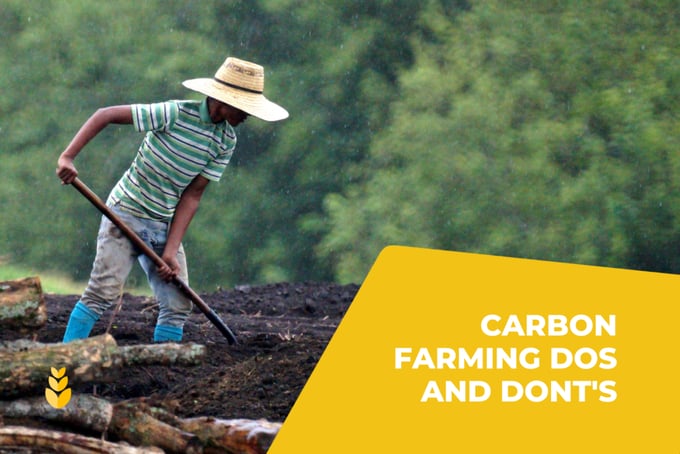May 30, 2025 | 14:29 GMT +7
May 30, 2025 | 14:29 GMT +7
Hotline: 0913.378.918
May 30, 2025 | 14:29 GMT +7
Hotline: 0913.378.918
In order to deliver on net-zero pledges, fossil fuel, agrochemical and food and beverage corporations all have significant stakes in this legislation. IATP’s new report digs into corporate interests that will influence the outcome of this legislation and the emerging threats to climate ambition.

Agriculture continues to evolve in practice and purpose. Carbon offset farming or the practice of sequestering carbon in agricultural soils is on the rise due to multiple factors related to the environment and farm profit.
Sequestering carbon from agricultural soils, forests and peatlands, so-called “carbon farming,” will be a key pillar of the CRCF. These so-called “nature-based solutions” are also a central element in corporate net-zero climate pledges of large polluters like Shell, Bayer and Nestlé.
Bayer, the agrochemical giant and founding member of a coalition with Volkswagen, H&M and others, announced at the recently concluded climate conference in Egypt (COP27) that the coalition will increase its investment by 100% into a program that generates carbon credits for avoiding deforestation. To shed light on the reality of corporate net-zero pledges and the significance of the European Commission’s proposal, IATP analyses submissions from Bayer and others to the Commission’s public consultations on the legislative proposal in this new report.
The report shows that these corporations view “carbon farming” in the EU’s carbon removal framework as a critical opportunity to generate significant quantities of carbon credits to offset emissions. Compensating for emissions through the purchase of carbon credits (in other words, paying someone else to reduce emissions or sequester carbon from the atmosphere) is known as offsetting. Offsets give polluters a major loophole to continue polluting while promoting a green image.
Although the visions of different industry actors of what the certification framework should look like differ in various aspects, they agree on one point: The framework should pave the way for EU-certified offsets.
Food and beverage lobby groups, such as FoodDrinkEurope and the European Dairy Association, champion limiting carbon farming offset credits to compensate for emissions in their own supply chains, a practice coined as “insetting.” Insetting would allow actors in the industrial agriculture system to maintain their polluting business model, while ensuring that tech or fossil fuel corporations do not poach these credits. Competition for such credits bought on voluntary carbon markets comes from Europe’s fossil fuel companies, such as Shell, Eni and Equinor, that are subject to obligatory emissions reduction targets under the EU’s cap and trade scheme, the EU Emissions Trading System (EU ETS). As pressure increases for these companies to reduce their emissions, they want to use these removal offsets to achieve their climate targets.
Agrochemical companies, like Bayer, Yara and Syngenta, as manufacturers of fertilizers and pesticides are also subject to the EU ETS emissions reduction targets. They have become increasingly involved in creating carbon farming schemes and call for certificates that can be used both, in voluntary and compliance schemes, to ensure a large and stable market for their carbon credit business and regulatory requirements. These companies are strongly pushing to open the EU’s framework to trading offsets in international markets. This perspective was amplified at COP27.
Overall, corporate demand is aimed at creating the largest possible supply of carbon removal offsets. To achieve this, they call for the certification of all kinds of offsets under the CRCF, including practices that, in fact, do not remove carbon from the atmosphere, such as reductions of emissions intensity and avoided emissions. Conflating these very different concepts brushes over the fundamentally different significance these measures have for climate mitigation. Only permanent storage of carbon that has been removed from the atmosphere can be claimed to be a carbon removal. At best, reducing or avoiding emissions only decreases the amount of carbon that is added to the atmosphere.
These companies also disregard fundamental concerns like the permanence of land-based removals. Land-based sequestration is highly reversible due to human actions, natural disturbances, such as droughts or floods, and climate crisis itself. They also gloss over the lack of certainty in measuring soil carbon or the imprecise and unreliable state of cheap technologies, such as remote sensing and modelling.
The European Commission must respond to the concerns voiced by climate, environmental, food and farming groups and reject corporate demands that would provide a major loophole to polluters and significantly water down climate ambition in the EU.
A leaked text of the proposal suggests that corporations might get the framework they are asking for and puts the EU on a dangerous trajectory, opening the floodgates for offsets and allowing companies to greenwash their operations. EU institutions must ensure that this will not happen.
(iatp)

(VAN) Vikas Rambal has quietly built a $5 billion business empire in manufacturing, property and solar, and catapulted onto the Rich List.

(VAN) Available cropland now at less than five percent, according to latest geospatial assessment from FAO and UNOSAT.

(VAN) Alt Carbon has raised $12 million in a seed round as it plans to scale its carbon dioxide removal work in the South Asian nation.

(VAN) Attempts to bring down the price of the Japanese staple have had little effect amid a cost-of-living crisis.

(VAN) Fourth most important food crop in peril as Latin America and Caribbean suffer from slow-onset climate disaster.

(VAN) Shifting market dynamics and the noise around new legislation has propelled Trouw Nutrition’s research around early life nutrition in poultry. Today, it continues to be a key area of research.

(VAN) India is concerned about its food security and the livelihoods of its farmers if more US food imports are allowed.